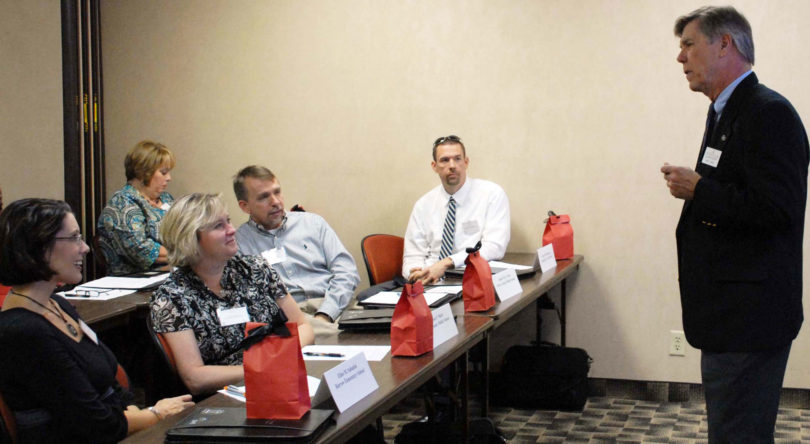Georgia school administrators face many challenges today. They must improve test scores, meet Adequate Yearly Progress goals, reduce discipline problems and increase parent involvement, just to name a few. It’s a tough job for veteran school principals, much less new principals just starting their careers in educational administration.
In an effort to support Georgia school principals in their first, second or third year, the College of Education is partnering with the Georgia Association of Educational Leaders to establish the Early Career Principal Residency Program.
“We are keenly aware of the many challenges and intense pressures faced by principals today, especially new principals,” said Jack Parish, a lecturer in the education college’s department of lifelong education, administration and policy, who is directing the two-year program.
“Leadership capacity building can best be achieved through a formal support system. The Early Career Principal Residency Program will provide principals with real-time, performance-based professional learning at a time when they need it most,” said Parish, a retired superintendent of Henry County Schools.
The program kicked off last fall on UGA’s Athens campus with an introductory session for the first cohort of 16 principals. Future sessions will be held in Athens, on UGA’s Griffin campus and at GAEL conferences around the state. A second cohort is expected to begin this fall.
The idea for the program was born in the fall 2009 meeting of the Superintendents Education Policy Advisory Group. Arthur M. (Andy) Horne, dean of the College of Education, created the group to facilitate improved communication and understanding of issues between college faculty and school district executives across the state.
The program aims to develop leaders’ knowledge and ability to promote the success of all students and continue the learning experience beyond the initial leader preparation phase to the induction/residency phase.
It includes face-to-face seminars, interactions with experts in educational leadership-both practitioners and academicians, performance-based activities linked to job-embedded learning, a coaching component to provide ongoing support, the development of a community of learners made up of early career principals across the state and the integration of technology to connect the cohort and support content delivery.
Content for the program will be developed around the six Interstate School Leaders Licensure Consortium standards: vision, instructional leadership, management, collaboration, ethics and politics.
“This program is just what Georgia needs today to ensure that our schools and systems have well-prepared, visionary leaders,” said Stanley DeJarnett, superintendent of Morgan County Schools. “The program bridges the gap between research and practice, pre-service training and the demands of the new work of 21st century education leaders.”
Instruction in the program will be provided by UGA faculty and current educational leaders through an integration of theory and practice and a co-teaching model. Participants will have opportunities to learn from leading researchers and scholars in their fields.
Practitioners who have achieved positive results in their schools will facilitate participants’ immediate application of knowledge through case studies, problem solving and other interactive learning strategies.
Participants will be matched with a seasoned administrator, acting as a coach, who has experience in school settings similar to the participant’s school. The program’s coaching component will be provided through coordination with GAEL.
Ellen Sabatini, principal of David C. Barrow Elementary School in Clarke County, said the program has been beneficial to her as a first-year principal.
“I have enjoyed getting to know and talking with other early career principals around the state. We have been able to share ideas and problem solve, as well as learn from experts in the field from both the theoretical and practitioner perspectives,” she said. “As a new principal, there is so much to think about and so much to do each day, so it’s important to have this time to think about the big picture and plan for the future.”
An advisory group, made up of superintendents, central office personnel and school principals, has been formed to provide ongoing guidance for the development and delivery of the program. The group provided suggestions for program content based on their observed needs of early career principals.
PLUs will be offered to participants, and there will be program evaluation to measure the outcomes of leadership development.







